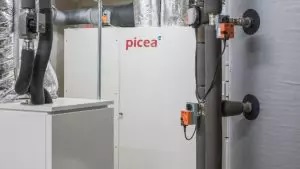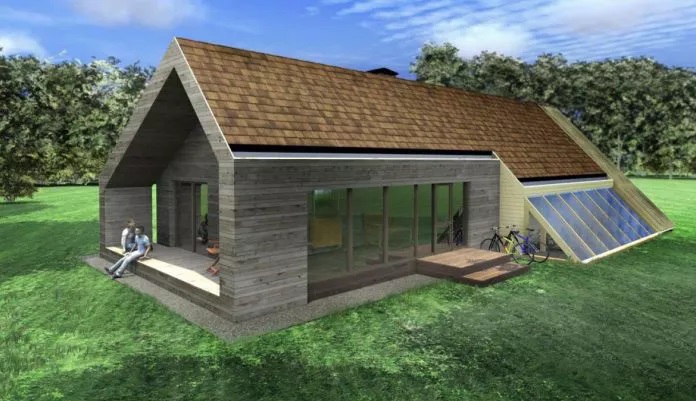A number of innovative technologies are being developed around the world that makes it possible to provide autonomy at home through renewable energy sources. Germany was no exception in this race. Recently, a multifunctional power system has appeared on the German market. This equipment can provide electricity, hot water and home heat thanks to the use of solar energy and the hydrogen component.
The power system was called Picea. As its manufacturer is the company HPS Home Power Solutions GmbH. The engineers who designed this system claim that thanks to their invention, a private house can become fully energy-independent and environmentally friendly at the same time.
The Picea system includes a whole list of auxiliary equipment. These devices are located within the system casing.
The power system from the German manufacturer includes:
- fuel cell (this component generates electricity and heat in the cold season);
- energy storage devices with a capacity of 25 kilowatt-hours;
- electrolyzer (the device allows transforming the energy of the sun into hydrogen throughout the summer);
- controller;
- inverter installation;
- special containers filled with hydrogen (they play the role of a seasonal battery and have a capacity of 350 to 1,000 kilowatt-hours);
- heat accumulator (the device is a container with high temperature water);
- a ventilation device that generates heat and moisture recovery in the room (the efficiency of heat exchange reaches 93 percent);
- control device.
Experts in the field of alternative energy argue that at this stage of development of this area, many world companies invest a significant portion of the funds in the development of similar technologies for private homes.
 SES in tandem with batteries is able to fully satisfy the energy demands of a private house. In addition, the heat supply of the residential building is carried out. When surplus electricity arises, the system immediately transforms them into hydrogen and sends it to storage in special containers. In the cold period, with the help of a fuel cell, the hydrogen accumulated in the cylinders is converted into electricity and heat energy.
SES in tandem with batteries is able to fully satisfy the energy demands of a private house. In addition, the heat supply of the residential building is carried out. When surplus electricity arises, the system immediately transforms them into hydrogen and sends it to storage in special containers. In the cold period, with the help of a fuel cell, the hydrogen accumulated in the cylinders is converted into electricity and heat energy.
It should also be noted that during the conversion of hydrogen into energy, the fuel cell releases a certain amount of moisture. It is used by the ventilation system to increase the humidity in the house.
The manufacturer especially notes the small size of the system. To install Picea on the territory of the residential house will need only 3 square meters of free space. An additional requirement for installation is the availability of 7 square meters of free space outside the building. This area will be required for the installation of hydrogen cylinders.
The German energy system can provide 8 kilowatts of regular capacity. The peak increase in these indicators is possible up to 20 kilowatts.
 It should be noted that the average German family of 5 people living in a private house needs 4,000 kWh during the year. Based on these calculations, the manufacturer advises installing SES, whose power is 8-12 kilowatts. The limits of the efficiency of a solar power plant are determined by the volume of the hydrogen storage ring.
It should be noted that the average German family of 5 people living in a private house needs 4,000 kWh during the year. Based on these calculations, the manufacturer advises installing SES, whose power is 8-12 kilowatts. The limits of the efficiency of a solar power plant are determined by the volume of the hydrogen storage ring.
The energy system is able to fully satisfy the request of a medium-sized private house for electricity and hot water. As for the heating system, in the realities of the average household without an auxiliary heat source is indispensable.
According to the producer’s promise, the system is able to provide the household with heat by 60 percent. If the private house is pre-insulated and increased its energy efficiency to the maximum level, then Picea is able to satisfy the energy and heat needs in full.
The cost of such a system of the German manufacturer starts from 54 000 euros. The final price is determined for each object individually. It all depends on the square of the room and the configuration of the devices. The cost of installation work is not calculated in advance.


